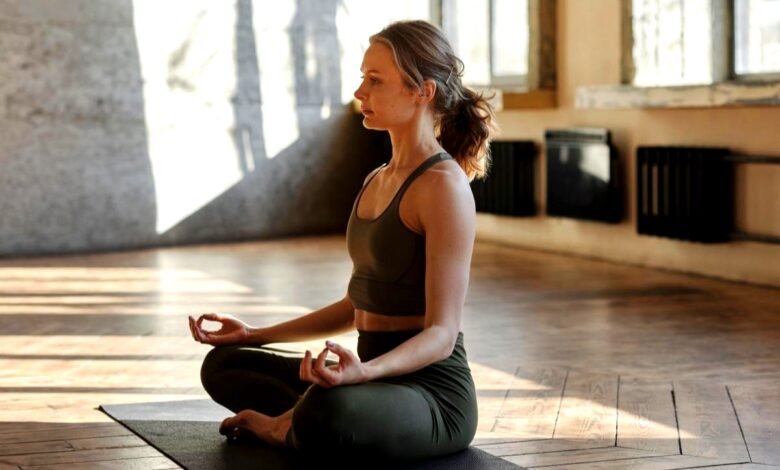How to Start Meditating: A Beginner’s Guide to Inner Peace
This beginner's guide will walk you through everything you need to know to start meditating in the begining offering practical steps, tips, and techniques to integrate this transformative practice into your daily routine.

In today’s fast-paced world, finding a moment of stillness is more vital than ever. Meditation offers a pathway to inner peace, emotional balance, and mental clarity. If you’re looking to start meditating, you’re embarking on a journey that can profoundly change your life. This beginner’s guide will walk you through everything you need to know about meditation for beginners, offering practical steps, tips, and techniques to integrate this transformative practice into your daily routine.
Why Start Meditating?
Before diving into how to start meditating, it’s important to understand why meditation is so beneficial. Research consistently highlights the many benefits of meditation, including
- Reduced stress and anxiety
- Improved focus and concentration
- Enhanced emotional health
- Better self-awareness
- Increased patience and tolerance
- Better sleep quality
- Lower blood pressure
Starting a meditation practice can help you tap into these benefits, even if you only commit a few minutes a day.
How to Start Meditating: Simple Steps for Beginners
Starting a new habit can be daunting, but meditation doesn’t have to be complicated. Here’s a step-by-step guide to help you start meditating with confidence.
1. Choose Your Meditation Style
There are many different styles of meditation for beginners. Some popular forms include:
- Mindfulness Meditation: Focuses on being present and aware without judgment.
- Guided Meditation: Involves following a guide’s voice to relax and visualize.
- Mantra Meditation: Centers on the repetition of a word or phrase.
- Loving-Kindness Meditation: Focuses on cultivating an attitude of love and compassion.
- Body Scan Meditation: Involves focusing attention on different parts of the body.
Choose the style that resonates with you and matches your goals.
2. Find a Quiet Space
Your environment plays a critical role in your ability to meditate effectively. Find a quiet, comfortable space where you won’t be disturbed. This could be a special corner of your home, a peaceful park, or even your office during a break.
3. Set a Time Limit
When you start meditating, it’s better to begin with short sessions. Even 5 to 10 minutes can make a noticeable difference. As your meditation practice grows, you can gradually increase your meditation time.
4. Sit Comfortably
You don’t need to sit cross-legged on the floor unless you want to. Sit in a position that’s comfortable but alert — in a chair, on a cushion, or even lying down if necessary.
5. Focus on Your Breath
One of the simplest and most powerful meditation techniques is to focus on your breathing. Feel the inhale and exhale. When your mind inevitably wanders, gently bring it back to your breath.
6. Accept Distractions
Many beginners worry about doing meditation “wrong” because their minds wander. Distraction is natural. The key is not to judge yourself. Simply acknowledge the distraction and return your focus to your breath or mantra.
7. End Gently
When your timer goes off, slowly open your eyes. Take a moment to notice how you feel. Appreciate the time you’ve taken for yourself before moving on with your day.
Common Challenges When You Start Meditating
Starting anything new comes with obstacles. When you begin your meditation practice, you might face:
- Restlessness: Feeling like you can’t sit still.
- Sleepiness: Feeling drowsy or dozing off.
- Frustration: Worrying you’re “not doing it right.”
- Busy Mind: Thoughts racing nonstop.
Remember, these challenges are part of the journey. Meditation is about observing these experiences without judgment.
Meditation Tips for Beginners
Here are some meditation tips to make your journey smoother:
- Be consistent: Try to meditate at the same time each day.
- Start small: Begin with just a few minutes daily.
- Use guided meditations: Apps like Headspace, Calm, and Insight Timer are great tools.
- Track your progress: Keep a simple journal to note your experiences.
- Stay patient: Meditation is a skill that improves with time.
How to Meditate Daily
Creating a daily meditation habit is key to reaping the full benefits. Here’s how to weave it into your routine:
- Morning Ritual: Start your day with meditation to set a positive tone.
- Lunch Break Reset: A mid-day session can recharge your focus.
- Evening Wind-Down: Use meditation to relax before bed.
Even just five minutes of mindfulness meditation daily can create noticeable shifts in your mental and emotional state.
Deepening Your Meditation Practice
As you get more comfortable with meditation, you might want to explore ways to deepen your practice:
- Attend meditation retreats
- Join a meditation group
- Explore different meditation techniques
- Study meditation philosophy
- Incorporate mindfulness into everyday activities
Expanding your practice helps maintain motivation and uncover deeper layers of self-awareness.
Benefits of Meditation: What Science Says
Research on meditation shows remarkable results:
- Neuroscience studies show that meditation changes brain structure, enhancing areas related to memory, empathy, and stress regulation.
- Psychology research highlights that regular meditation reduces symptoms of depression and anxiety.
- Medical studies suggest meditation can aid in managing chronic pain and improving heart health.
Clearly, when you start meditating, you are investing in a healthier, happier you.
Using Guided Meditation to Start Meditating
Guided meditations are an excellent way for beginners to ease into the practice. A guide will lead you through the process, helping you stay focused and relaxed. You can find guided meditations through:
- Meditation apps
- YouTube channels
- Podcasts
- Local meditation centers
Some popular topics for guided meditation include stress reduction, sleep support, self-love, and gratitude.
Creating Your Personal Meditation Space
Designating a special spot for meditation can enhance your practice. Consider including:
- A comfortable seat or cushion
- A small altar with meaningful objects
- Soothing scents like incense or essential oils
- Soft lighting or candles
- A journal to record your experiences
Having a dedicated space signals to your mind that it’s time to shift into a meditative state.
Meditation Myths Debunked
There are several misconceptions that can deter people from starting their meditation journey. Let’s debunk a few:
- “I have to clear my mind completely.” Not true. The goal is awareness, not emptiness.
- “I need hours to meditate.” Even a few minutes daily is beneficial.
- “Meditation is religious.” While it has roots in spiritual traditions, meditation itself is secular and universally accessible.
- “I’m not good at meditation.” There’s no such thing as being “bad” at meditation.
Understanding these myths can help you feel more confident as you start meditating.
Final Thoughts: Your Journey to Inner Peace
Learning how to start meditating is one of the best gifts you can give yourself. With patience, practice, and self-compassion, you’ll unlock a wellspring of inner peace, resilience, and joy.
Remember, there’s no “perfect” way to meditate. What matters most is that you start meditating and stay committed to your practice, however it looks.
Every moment spent in meditation brings you closer to the calm, clarity, and connection you seek.











